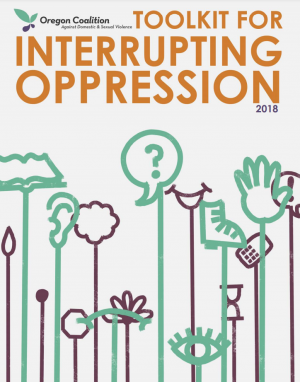Resources Library:
Start a Search:
The Virginia Partnership for Community Defined Solutions Contact List
This contact list provides the current names and contact information of participating partners in the Virginia Community Defined Solutions partnership grant.
Title IX and Dating Abuse from Break the Cycle
Title IX of the Education Amendments of 1972 (“Title IX”) is a Federal civil rights law prohibiting discrimination on the basis of sex in any federally funded education program or activity. While public focus lately has been placed on better implementing Title IX at colleges and universities, very little has been dedicated to how the law should work in secondary schools. This document addresses the need for efficient Title IX implementation in secondary schools.
Toolkit for Interrupting Oppression - from the Oregon Coalition Against Domestic and Sexual Violence

The Oregon Coalition Against Domestic and Sexual Violence has a rich history of anti-oppression work, supporting and aligning with those who dismantle oppression and build safer communities. Amidst this ongoing work, questions arise as to how we can do more strategic interruptions, how we intervene with an awareness of power (ours and others), and how we can avoid harming or re-victimizing ourselves and others in the process of doing anti-oppresion work. This project seeks to explore these questions while adding nuance to and expanding on the anti-oppression work and interruption tools man of us already use.
This material was created by the OCADSV in the hopes of increasing confidence and capability to intervene when witnessing harm, providing some options, and sparking problem-solving creativity. To view the resource, click the file below.
Toolkit for Law Enforcement & Legal Professionals on Understanding & Investigating Technology Misuse
NNEDV (National Network to End Domestic Violence) is pleased to announce the launch of their new Toolkit for Law Enforcement & Legal Professionals on Understanding & Investigating Technology Misuse. This toolkit was developed to meet the needs of law enforcement, attorneys, court personnel, community corrections officers, and other professionals to better serve survivors of technology-facilitated abuse. It provides thorough guides and resources on evidence collection for some of the most common technologies misused by abusers and perpetrators.
Click here to view these resources.
Trafficking: Considerations & Recommendations for Battered Women’s Advocates
Advocacy for trafficked women differs from that provided to battered women and although advocates are accustomed to working with legal and social service systems, this work challenges the way they typically interact with systems and collaborate with other agencies or providers. These considerations and recommendations will assist programs already working with trafficked victims or programs thinking about doing so. Although boys and men are also trafficked and there are other ways women are exploited, this paper only focuses on women and girls brought in as a group for sex-trafficking.

